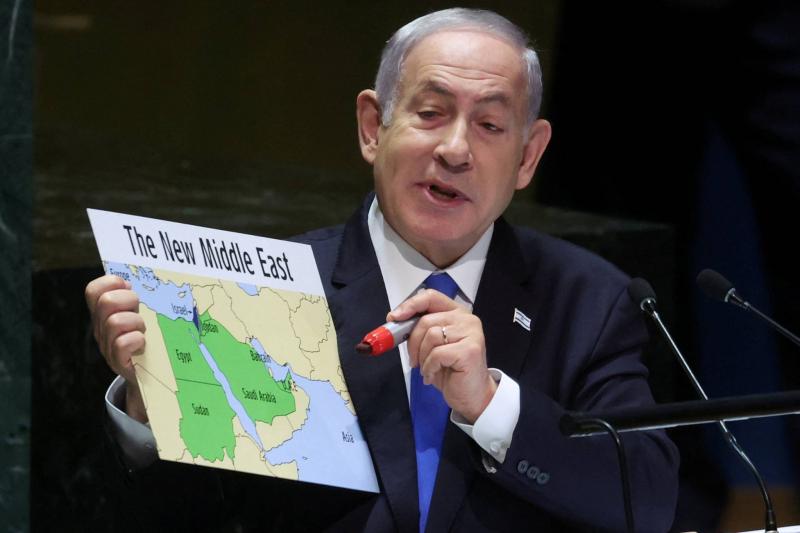Israeli Prime Minister Benjamin Netanyahu believes that "Israel shares many common interests with Arab countries, which will allow for broader peace agreements." In his speech at the 78th UN General Assembly in New York on Friday, Netanyahu stated that "peace with Arab nations will increase the chances of reaching peace with the Palestinians." He emphasized that "Palestine should not have the veto power over the peace agreements with Arab countries."
He pointed out that "we are close to reaching peace with the Kingdom of Saudi Arabia, which will open the door to peace throughout the region, and peace between Saudi Arabia and Israel will create a new Middle East." Netanyahu called on Palestinian President Mahmoud Abbas to "stop spreading hatred" and urged Palestinians to "recognize the right of Jews to establish their state."
Regarding Iran, Netanyahu said that Tehran will work to undermine peace and accused it of violating the nuclear agreement without any sanctions imposed on it. Such a complex agreement is likely to require significant support from American lawmakers, a challenging endeavor with the upcoming presidential elections scheduled for 2024. While Netanyahu credited Trump for previous agreements, he expressed hope that the current U.S. administration would reach this agreement despite U.S. officials insisting that the road ahead remains long and that there are no guarantees of success. He said, "I believe we can achieve peace with Saudi Arabia under President Biden."
Despite Netanyahu expressing his readiness to seek some form of settlement with the Palestinians, whom the right-wing Israeli government refuses to provide a state for, he stated, "We must not give the Palestinians the right to veto new peace treaties with Arab nations." Palestinian President Mahmoud Abbas said on Thursday in front of the UN General Assembly, "Anyone who thinks that peace can be achieved in the Middle East without our people receiving all their rights is mistaken."
**Iranian Efforts to Sabotage Peace Efforts**
Netanyahu indicated that Iran is attempting to undermine the peace deal with Saudi Arabia. He often uses the UN platform to warn about Iran. However, he mentioned that normalization is already in progress, referencing the current air corridor for Israeli airlines over Saudi territory and the ambitious plan announced by Biden this month to integrate the two countries into a rail and shipping network that would extend from India to the Mediterranean.
Netanyahu illustrated the railway project by drawing a red line on a map of the region, simulating a speech he delivered at the UN in 2012 where he drew a "red line" regarding Iran's nuclear efforts. He said, "Today I hold this red pen to show a great blessing," describing normalization with Saudi Arabia as "an extraordinary shift, a huge change, and another axis of history."
In an interview with Fox News, Netanyahu expressed that he is "pleased" to hear the positive remarks made by the Saudi crown prince, the de facto ruler of the kingdom, in a previous interview with the American network. He stated in parts of the interview that will air in full later on Friday, "(I want) to borrow a phrase, which is that I believe we get closer to peace every day." He added that he does not want to "downplay the obstacles we face," but emphasized that he, Biden, and Mohammed bin Salman "strongly want to reach a conclusion," stating, "I believe this really increases our chances of success."
Shortly after Netanyahu's speech at the UN, his office stated that the Prime Minister made an error when he said that "Iran must face a real nuclear threat" to prevent it from acquiring a nuclear weapon. Netanyahu's office clarified that he misread a pre-prepared text that called for "a real military threat" against the Iranian nuclear program. Those words were consistent with what Netanyahu has often stated before. Iran denies seeking to acquire a nuclear bomb. Israel has neither confirmed nor denied possessing nuclear weapons but is widely believed to be the only nuclear-armed state in the Middle East.




